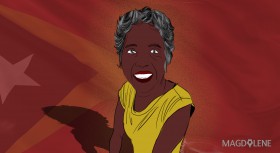My first encounter with Ari happened a couple of months ago on a remote island far from Jakarta. It took two days to get there, starting with two flights that took over five hours. The next morning we continued on a speedboat for an hour and, finally, the last two hours on a motor taxi.
That evening we were relaxing in a small guestroom, in one of the local houses where I would be staying for several days. The living room felt crammed as people were coming in to join our conversations. It was dimly lit, the only light came from an oil lamp, but that did not make our conversation any less enjoyable.
I found out from them that it was not sailing season yet, because the big waves and strong wind made it too risky to go to sea on their traditional wooden sail boats. The harvest season of cassava, their staple food, was not for a couple more weeks, and time was often passed with conversations and laughter like that evening.
Then came Ari. He greeted us at the door and people immediately let him in. He looked clean and tidy, in a white shirt tucked into a pair of slightly tight jeans with a black leather belt. He stood out among the other people in the village whose clothes were soiled with dirt or ash from firewood they used to cook. One of the women went to the kitchen so that Ari could join us dining in the livingroom.
The contrast became even more apparent when Ari sat on the floor in front of me. His long straight hair, well taken care of, was tied back in a pony tail. His face was brighter than the rest of his skin, thanks to a thin layer of white power. He wore a red lipstick.
With a smile and in a friendly voice, Ari asked me general questions like where I came from, what I was there for, and how long I would stay there. Our conversation flowed easily. He asked me what kind of food I already tried and whether I liked it or not.
“Cassava and fish are really delicious,” I told him in their dialect to the laughter of the others.
Ari told me he had never been to Jakarta and he wanted to know what life was like there – is it really like it is on television?
I told him how I admired the island’s beauty and the people’s hospitality. He replied that there had never been anyone from Jakarta to the village, and that they badly needed transportation to go to the nearest city. The roads were in bad shape, and people would rather travel on their boats than go by land.
Suddenly one of the locals cut in, “Ari is different. He’s pretty. He likes men.”
Every one laughed. I stole a glance at him to see his reaction. He seemed only slightly annoyed.
“Oh, please,” he dismissed the guy lightly, and we continued the conversation as if nothing happened.
After about one and a half hour, Ari excused himself home. The others politely let him go and he invited me to come to his house. Unfortunately, I never got around to doing it. We met again only once after that evening, when I passed him on the street in the village. Still looking dapper, Ari told me about his activities that day comfortably.
That experience got me thinking. How could he express himself so freely in a small, tight-knit community like this? Shouldn’t he hide behind the norms and values that the people hold fast? And how could he be so brave to dress up that way and interact easily with people, as if he was not afraid of being accused of “disturbing harmony” or “giving bad influence” to children.
Why did nobody try to mock him, whether to his face or after he was gone? Except for that one remark, Ari seemed to be treated with respect by the villagers, like he was a normal part of life in that remote village.
I think about this in the light of the negative stories of discrimination against LGBT people in other places and in Jakarta. Or maybe because of the assumption that openness, freedom and tolerance to difference is a product of the Western influence.
Perhaps I would only be able to understand it completely if I returned and stayed longer in the village with Ari and the other people. But, at the very least, this episode has taught me that people at grass roots level may provide more room for acceptance to difference than we give them credit for.
Denny Firmanto Halim is freelance writer and translator, as well as researcher for Reality Check Approach, a method focused on understanding realities of ordinary people in their own contexts. Further info, check: http://www.reality-check-approach.com








Comments